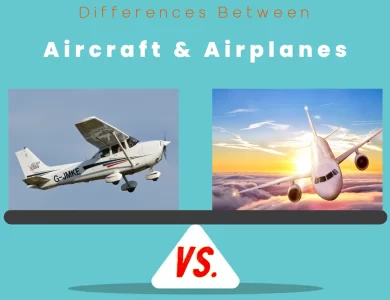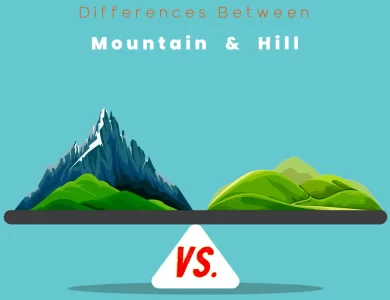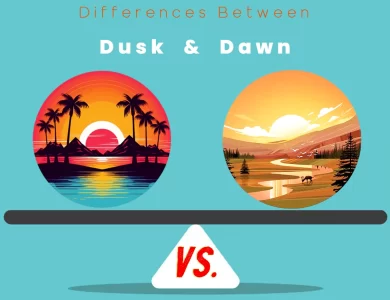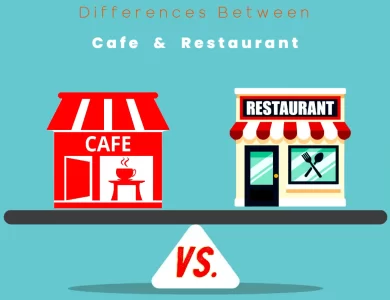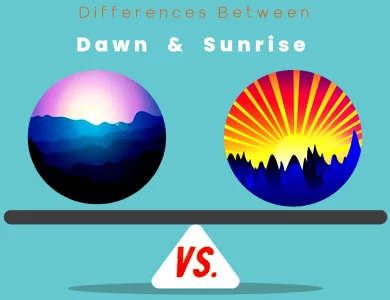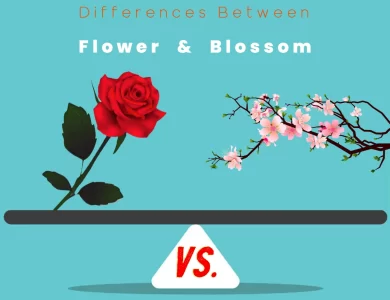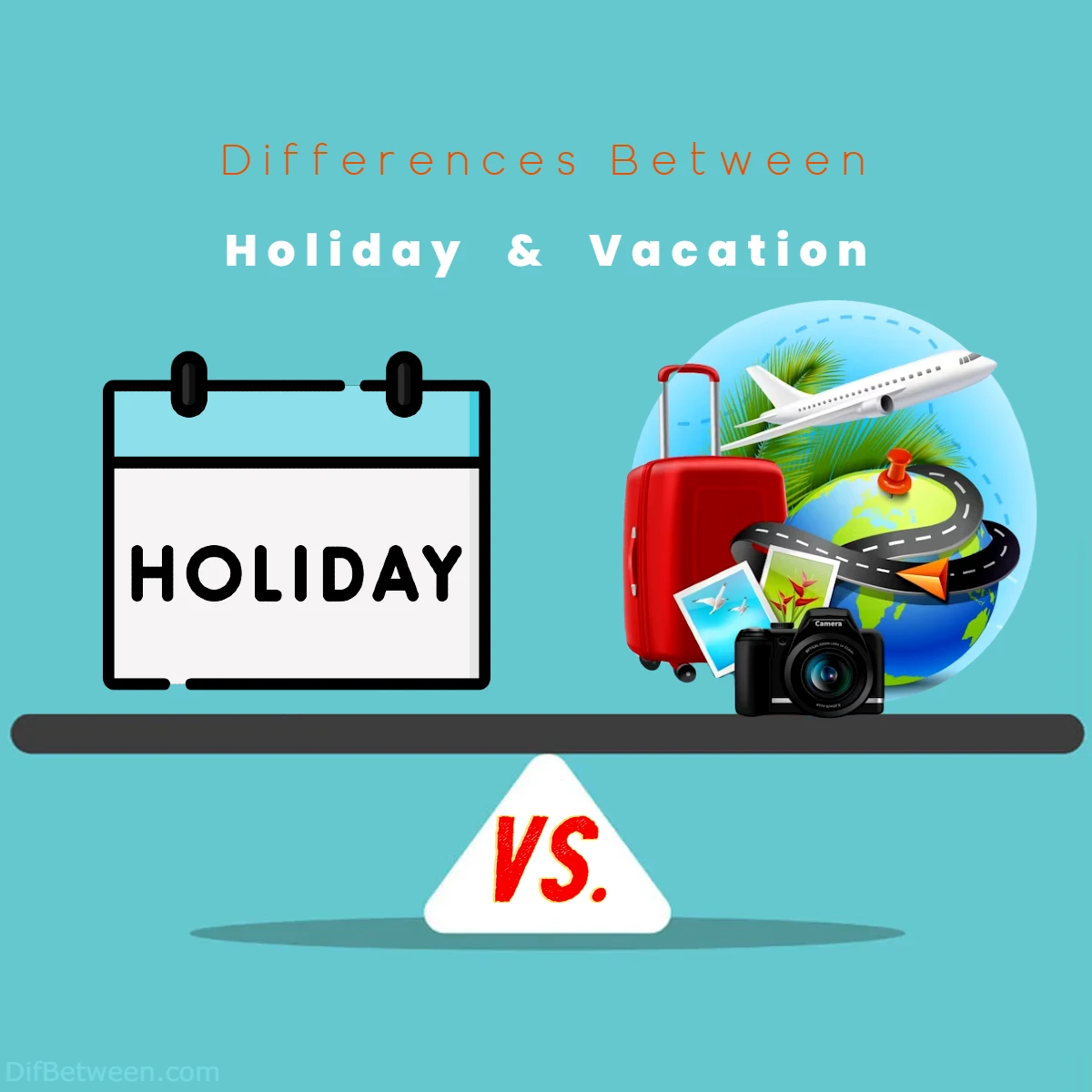
| Aspect | Holiday | Vacation |
|---|---|---|
| Definition and Origin | Tied to cultural, religious, or national events | General term for leisure break |
| Geographical Variation | More common in British English | Predominantly used in American English |
| Duration and Frequency | Fixed periods, often annual | Flexible in duration and timing |
| Purpose and Activities | Celebrate specific events, traditions | Focus on relaxation, rejuvenation, exploration |
| Planning and Preparation | Advance planning, holiday-related preparations | More flexible, can be spontaneous |
| Budget Considerations | May involve holiday-specific expenses | Greater budget flexibility |
| Social and Cultural Aspects | Strong cultural and social components | Emphasis on personal enjoyment and exploration |
| Work and Responsibilities | Work may be busier during holidays | Need to coordinate vacation time with work |
| Travel Trends and Popular Destinations | Popular destinations tied to holiday celebrations | Diverse destination choices based on interests |
Picture this: You’re yearning for a break from the daily grind, that moment when you can pack your bags and bid adieu to the routine. But, as you stand at the crossroads of planning your escape, you’re confronted with a delightful dilemma – should you opt for a holiday, steeped in cultural richness and traditions, or should you indulge in the liberating freedom of a vacation?
Differences Between Holiday and Vacation
The main differences between Holiday vs Vacation lie in their origins and characteristics. While a holiday is typically tied to cultural, religious, or national events, often with fixed dates, vacations offer more flexibility in timing and destination choice. Holidays often involve shorter breaks and focus on celebrating specific traditions, fostering social connections, and following customary practices. In contrast, vacations emphasize personal relaxation, exploration, and individual interests, making them suitable for longer, more flexible getaways. Understanding these distinctions can help you tailor your travel plans to your preferences and goals.
Definition and Origin
Holiday
The term “holiday” primarily finds its roots in British English and is widely used in countries like the United Kingdom, Australia, and New Zealand. In these regions, a holiday typically refers to a day or period of celebration, commemoration, or relaxation. Holidays can be related to cultural, religious, or national events, and they often involve special customs and traditions. For instance, Christmas, Easter, and Thanksgiving are all holidays celebrated in various parts of the world.
In the context of travel, a holiday is a term commonly used to describe a leisure trip or vacation. Britons, for example, often say they are going on a “holiday” when planning a getaway.
Vacation
On the other hand, “vacation” is the term predominantly used in American English to describe a period of time when individuals take a break from work, school, or their usual activities to relax and travel. The word “vacation” itself is derived from the Latin word “vacatio,” which means “freedom” or “release from duty.” In American culture, vacations are highly valued, and taking time off work for leisure is a common practice.
Geographical Variation
Holiday
The use of the term “holiday” varies significantly by region. While it’s the preferred term in British English, it may not be as commonly used or understood in American English. In some English-speaking countries like India, Canada, and South Africa, both “holiday” and “vacation” are understood and used, but their meanings can differ slightly based on local context.
Vacation
“Vacation” is the standard term used in American English and is widely recognized in the United States and Canada. However, in countries where British English is prevalent, such as India and Australia, “vacation” is also understood but may be less commonly used in everyday conversation.
Duration and Frequency
Holiday
Holidays, as cultural or national celebrations, are typically fixed periods of time that occur on specific dates each year. They can last anywhere from a single day, like Independence Day in the United States, to several days or even weeks, such as the Christmas and New Year period. Holidays are generally recurring events, happening annually or on designated occasions.
In the context of travel, a holiday can vary in duration, but it’s often associated with longer breaks, such as a week or more, especially when people take time off work to travel during holiday seasons.
Vacation
Vacations, on the other hand, are personal leisure breaks that individuals plan and take based on their schedules and preferences. They can vary in duration from just a weekend getaway to several weeks or even months, depending on factors like available time off, budget, and the desire for relaxation or exploration.
Unlike holidays, vacations are not tied to specific cultural or national events and can be taken at any time of the year. The timing and duration of a vacation are highly flexible, making it easier for people to fit them into their busy lives.
Purpose and Activities
Holiday
The primary purpose of a holiday is to celebrate, commemorate, or observe a specific event, tradition, or cultural significance. Holidays often involve special rituals, gatherings with family and friends, and activities related to the occasion. For example, during Christmas, people exchange gifts, decorate trees, and attend religious services to celebrate the birth of Jesus Christ.
When referring to a holiday as a travel experience, it often involves visiting a destination with the intention of participating in events or festivities related to the holiday. For instance, someone might travel to New Orleans to experience Mardi Gras celebrations.
Vacation
Vacations are more generalized leisure breaks focused on relaxation, rejuvenation, and exploration. The primary purpose of a vacation is to unwind, destress, and enjoy leisure activities. While vacations can include visits to cultural or historical sites, adventure activities, or even attending events, they are not tied to a specific occasion or celebration.
Vacationers have the freedom to choose from a wide range of activities based on their interests, whether it’s lounging on a beach, hiking in the mountains, exploring a new city, or simply reading a book by the pool.
Planning and Preparation
Holiday
Planning for a holiday, especially when it’s associated with a cultural or national celebration, often requires more advance preparation. This can include arranging travel and accommodation well in advance due to high demand during holiday seasons. Additionally, individuals may need to purchase gifts, decorations, or traditional foods associated with the holiday.
In terms of travel, holiday planning may involve researching specific destinations known for their holiday celebrations and making reservations accordingly. For example, planning a trip to witness the colorful Diwali festivities in India would require careful timing and arrangements.
Vacation
Vacations offer greater flexibility in terms of planning and preparation. Since they are not tied to specific dates or events, vacationers can choose when and where to go based on their convenience and preferences. This can lead to more spontaneous trips, and last-minute decisions to take a vacation are common.
Vacation planning typically involves selecting a destination, booking accommodation, and arranging transportation. However, the process may be less constrained by specific dates or traditions, allowing for a more relaxed approach to preparation.
Budget Considerations
Holiday
The cost of a holiday can vary widely depending on the nature of the celebration and the destination. Some holidays may involve significant expenses, such as buying gifts, hosting gatherings, or attending elaborate events. Traveling during holiday seasons can also be more expensive due to increased demand for accommodations and transportation.
In the context of a holiday trip, the budget may need to account for expenses related to participating in holiday-specific activities and events at the chosen destination. For example, attending the Carnival in Rio de Janeiro during the Brazilian holiday of Carnival may require budgeting for parade tickets and costumes.
Vacation
Vacations can be tailored to fit a wide range of budgets. While luxury vacations with five-star accommodations and fine dining are an option, budget-conscious travelers can also plan cost-effective vacations by choosing more affordable destinations, accommodations, and dining options.
One advantage of vacations is the flexibility to adjust the budget based on personal preferences. Travelers can decide whether to splurge on certain experiences or opt for a more frugal approach, making vacations accessible to a broader range of people.
Social and Cultural Aspects
Holiday
Holidays often have strong social and cultural components. They are times when people come together to celebrate shared traditions, values, and beliefs. Families and communities may gather for special meals, religious ceremonies, or festive events. Holidays can strengthen social bonds and provide a sense of belonging and identity.
When traveling during a holiday, individuals have the opportunity to immerse themselves in the local culture and customs associated with the celebration. This can lead to meaningful cultural experiences and interactions with locals.
Vacation
Vacations, while they can involve social aspects, are primarily focused on personal relaxation and exploration. They offer individuals the chance to disconnect from their daily routines and spend quality time with family or friends, but the emphasis is on personal enjoyment and leisure.
Traveling on vacation often provides opportunities to learn about different cultures, try new cuisines, and explore diverse landscapes. However, the level of cultural engagement during a vacation is typically driven by individual interests and preferences.
Work and Responsibilities
Holiday
During holidays, many people have time off work and school. Some holidays are even recognized as public holidays, meaning that businesses and institutions are closed, and employees are generally entitled to a day off with pay. However, this can vary by country and region.
For individuals who work in industries related to holidays, such as retail or hospitality, these times can be exceptionally busy, as they cater to the increased demand for holiday-related products and services.
Vacation
Vacations are typically taken at the discretion of the individual. Depending on their employment situation, individuals may need to request time off from work, and the approval of vacation time can vary depending on company policies and workload. In some cases, employees may need to plan their vacations around work commitments.
Unlike holidays, vacations are not tied to specific dates, and individuals have more control over when they choose to take time off for leisure. This flexibility allows for a wider range of travel opportunities throughout the year.
Travel Trends and Popular Destinations
Holiday
Popular holiday destinations often revolve around the specific holiday being celebrated. For example, many people travel to Rome during Easter to experience the Vatican’s Easter celebrations. Similarly, individuals may flock to New York City for the iconic Times Square New Year’s Eve ball drop.
These destinations gain popularity due to their unique holiday-related attractions and experiences, making them attractive choices for those seeking to immerse themselves in holiday traditions.
Vacation
Vacation destinations vary widely based on individual preferences and interests. Beach destinations like the Maldives, historical sites like Rome, and adventure destinations like New Zealand all attract vacationers throughout the year. Travel trends related to vacations are influenced by factors such as travel deals, seasonal weather, and emerging travel trends.
While some vacationers seek popular tourist destinations, others may opt for off-the-beaten-path locations to explore new cultures and landscapes away from the crowds.
Seasonal Timing
Holiday
Holidays are typically fixed on specific dates, which means your travel plans may be dictated by the timing of the celebration. For example, if you want to experience the vibrant Diwali festival in India, you’ll need to plan your trip around the festival’s dates, which vary each year.
Vacation
Vacations offer more flexibility when it comes to timing. You can choose to travel during off-peak seasons to avoid crowds and potentially get better deals on accommodations and flights. This flexibility can be especially advantageous for those with busy work or school schedules.
Table 1: Seasonal Timing Comparison
| Aspect | Holiday | Vacation |
|---|---|---|
| Timing | Fixed dates tied to holidays | Flexible, based on personal schedule |
| Crowds and Prices | Potential for crowds and higher prices | Opportunity to travel during off-peak times |
Destination Choice
Holiday
The choice of destination during a holiday is often tied to the specific holiday being celebrated. For instance, if you’re celebrating Chinese New Year, you might consider traveling to cities with large Chinese communities like Beijing or Singapore.
Vacation
Vacations offer a wide range of destination options based on personal interests. Whether you’re drawn to natural wonders, historical sites, or cultural experiences, you have the freedom to select a destination that aligns with your preferences.
Table 2: Destination Choice Comparison
| Aspect | Holiday | Vacation |
|---|---|---|
| Destination Options | Tied to holiday traditions | Broad range of options based on personal interests |
Travel Duration
Holiday
Holidays can vary in duration, but they often involve shorter breaks, such as a long weekend or a few days off work. This shorter timeframe is suitable for those looking for a quick getaway to celebrate a specific occasion.
Vacation
Vacations offer more flexibility in terms of duration. You can opt for a short weekend escape, a week-long adventure, or an extended trip lasting several weeks. The choice depends on how much time you can allocate for your travels.
Table 3: Travel Duration Comparison
| Aspect | Holiday | Vacation |
|---|---|---|
| Duration Options | Typically shorter breaks | Flexible duration, ranging from short getaways to extended trips |
Cultural Immersion
Holiday
Holidays often provide excellent opportunities for cultural immersion. You can participate in local customs, witness traditional celebrations, and interact with residents who are deeply connected to the holiday’s significance.
Vacation
Vacations can also offer cultural immersion, but the depth of cultural engagement is usually driven by personal interests. Travelers can choose to explore local culture, cuisine, and traditions based on their preferences.
Table 4: Cultural Immersion Comparison
| Aspect | Holiday | Vacation |
|---|---|---|
| Cultural Opportunities | Strong cultural ties and opportunities for immersion | Cultural engagement based on personal interests and choices |
Budget Flexibility
Holiday
The budget for a holiday may be influenced by the expenses associated with celebrating the specific occasion, such as purchasing gifts or participating in traditional activities.
Vacation
Vacations offer greater budget flexibility. Travelers can set their own budget based on their financial resources and preferences, allowing for a wide range of spending options.
Table 5: Budget Flexibility Comparison
| Aspect | Holiday | Vacation |
|---|---|---|
| Budget Control | Expenses related to holiday celebrations may be fixed | Greater control over budget, with options for both luxury and budget travel |
Holiday or Vacation : Which One is Right Choose for You?
Are you daydreaming about your next getaway? The decision to embark on a holiday or a vacation can significantly impact your travel experience. Let’s explore the key factors that can help you determine which one is the perfect choice for you.
Nature of the Break
Holiday
- Celebration and Tradition: Holidays are often linked to cultural, religious, or national events. If you’re someone who enjoys celebrating special occasions with time-honored traditions, a holiday may be your ideal choice. Think of lighting fireworks on the Fourth of July or exchanging gifts during Christmas.
- Community and Togetherness: Holidays often bring people together. They’re the times when families, friends, and communities gather to mark significant events. If being part of these communal celebrations warms your heart, a holiday is likely your cup of tea.
Vacation
- Freedom and Relaxation: Vacations offer the freedom to relax and recharge at your own pace. If you’re in dire need of some “me time” away from daily routines and responsibilities, a vacation can provide the ultimate escape.
- Personal Exploration: If you’re driven by the desire to explore new destinations, cultures, and experiences, a vacation allows you to tailor your trip to your interests. It’s your chance to tick off that bucket list and embark on adventures.
Timing and Duration
Holiday
- Fixed Dates: Holidays are typically tied to specific dates and occur annually. Your travel plans may need to align with these fixed dates, which can be both a pro and a con depending on your schedule.
- Short Breaks: Holidays are often shorter breaks, perfect for a quick getaway or a long weekend. They can provide a brief escape from routine without the need for extended time off.
Vacation
- Flexible Timing: Vacations offer flexibility in timing. You can choose when to go based on your convenience, making them suitable for those with demanding work or school schedules.
- Varied Durations: Whether you have a few days or several weeks to spare, vacations can cater to a wide range of durations. It’s all about what suits your availability and preferences.
Budget Considerations
Holiday
- Holiday Expenses: Holidays may come with specific expenses tied to the celebration, such as gifts, decorations, or special meals. These costs can be predictable but add to the overall budget.
- Seasonal Price Fluctuations: Traveling during holiday seasons can be more expensive due to increased demand for accommodations and transportation. Be prepared for potential price hikes.
Vacation
- Budget Flexibility: Vacations offer greater flexibility in setting your budget. You can choose from a range of options, from budget-friendly to luxury, depending on your financial resources.
- Opportunity for Deals: Since vacations don’t hinge on specific dates, you can take advantage of deals and discounts that may not be available during holiday periods.
Destination and Activities
Holiday
- Holiday-Centric Destinations: Holidays often lead travelers to destinations known for their specific celebrations. Think of New Orleans during Mardi Gras or Rio de Janeiro during Carnival.
- Focused Activities: Traveling during holidays provides opportunities to engage in holiday-specific activities and immerse yourself in local customs and festivities.
Vacation
- Diverse Destination Choices: Vacations open up a world of destination possibilities. Whether you’re drawn to the beach, the mountains, the city, or the countryside, you have the freedom to choose.
- Varied Activities: While on vacation, you can craft your own itinerary. Whether it’s lounging on a beach, exploring historical sites, or embarking on adventure activities, the choices are yours to make.
Social and Cultural Aspects
Holiday
- Cultural Significance: Holidays often carry deep cultural significance. They’re times when communities come together to celebrate shared values and traditions.
- Social Bonding: If you enjoy connecting with people and being part of communal celebrations, holidays provide ample opportunities for social bonding.
Vacation
- Personal Enjoyment: Vacations are primarily focused on personal relaxation and enjoyment. While they can involve social aspects, the emphasis is on individual experiences.
- Cultural Exploration: Traveling on vacation allows you to explore diverse cultures, cuisines, and landscapes based on your interests and curiosity.
Work and Responsibilities
Holiday
- Work and Holidays: Depending on your profession, holidays may be a time of increased work commitments, especially if you work in industries related to holiday celebrations, such as retail.
- Time Off Policies: Public holidays may grant you time off work with pay, but this can vary by country and employer policies.
Vacation
- Balancing Work and Vacations: Planning vacations may require you to coordinate with your workplace and schedule time off in advance. Approval can vary depending on your job responsibilities.
- Timing at Your Discretion: Vacations are not tied to specific dates, allowing you to plan trips around your work commitments and responsibilities.
Conclusion
The choice between a holiday and a vacation ultimately boils down to your personal preferences, goals, and circumstances. Both offer valuable opportunities for relaxation, exploration, and creating memorable experiences. Whether you’re savoring holiday traditions with loved ones or embarking on an adventure to new horizons, the world is yours to discover. So, which one will you choose for your next escapade?
FAQs
The main difference lies in their nature and purpose. A holiday is often associated with cultural, religious, or national events, celebrated with specific traditions and customs. Vacations, on the other hand, are more generalized leisure breaks focused on personal relaxation, exploration, and individual interests.
No, they are not. While the terms are sometimes used interchangeably, holidays are typically tied to specific dates and celebrations, whereas vacations offer greater flexibility in timing, destination, and activities.
Yes, you can travel during both holidays and vacations. However, the experiences and purposes of your trips may differ. Holiday travel often involves participating in holiday-related events, while vacations allow you to choose a destination and activities based on personal preferences.
The cost can vary depending on the destination, duration, and activities you choose. Holidays may involve holiday-specific expenses, while vacations offer budget flexibility, allowing you to tailor your spending to your preferences.
Both holidays and vacations can provide cultural immersion. Holidays often offer stronger cultural ties due to their association with traditions, while vacationers can engage with local culture based on personal interests.
Your choice depends on your preferences, goals, and circumstances. Consider whether you want to celebrate a specific event, participate in traditions (holiday), or seek personal relaxation and exploration (vacation). Your availability, budget, and interests will also play a role in your decision.
Yes, you can plan a vacation during a holiday season. However, be prepared for potential crowds and higher prices at popular holiday destinations during these times.
Holidays often lead travelers to destinations known for their specific celebrations, while vacation destinations vary widely based on individual interests, from beach getaways to cultural explorations.
Absolutely! Many people enjoy the best of both worlds by celebrating holidays with their loved ones and taking vacations to relax and explore. Balancing both can provide a well-rounded travel experience.
There is no right or wrong choice; it depends on what you’re seeking in your travel experience. Whether you opt for a holiday or a vacation, both offer opportunities for rest, relaxation, and adventure. Your decision should align with your personal preferences and goals.
Read More:
Contents
- Differences Between Holiday and Vacation
- Definition and Origin
- Geographical Variation
- Duration and Frequency
- Purpose and Activities
- Planning and Preparation
- Budget Considerations
- Social and Cultural Aspects
- Work and Responsibilities
- Travel Trends and Popular Destinations
- Seasonal Timing
- Destination Choice
- Travel Duration
- Cultural Immersion
- Budget Flexibility
- Holiday or Vacation : Which One is Right Choose for You?
- FAQs
